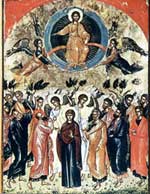At that time, Jesus came to a city of Samaria, called Sychar, near the field that Jacob gave to his son Joseph. Jacob's well was there, and so Jesus, wearied as he was with his journey, sat down beside the well. It was about the sixth hour.
There came a woman of Samaria to draw water. Jesus said to her, "Give me a drink." For his disciples had gone away into the city to buy food. The Samaritan woman said to him, "How is it that you, a Jew, ask a drink of me, a woman of Samaria?" For Jews have no dealings with Samaritans. Jesus answered her, "If you knew the gift of God, and who it is that is saying to you, 'Give me a drink,' you would have asked him and he would have given you living water." The woman said to him, "Sir, you have nothing to draw with, and the well is deep; where do you get that living water? Are you greater than our father Jacob, who gave us the well, and drank from it himself, and his sons, and his cattle?" Jesus said to her, "Everyone who drinks of this water will thirst again, but whoever drinks of the water that I shall give him will never thirst; the water that I shall give him will become in him a spring of water welling up to eternal life." The woman said to him, "Sir, give me this water, that I may not thirst, nor come here to draw."
Jesus said to her, "Go, call your husband, and come here." The woman answered him, "I have no husband." Jesus said to her, "You are right in saying, 'I have no husband'; for you have had five husbands, and he whom you now have is not your husband; this you said truly." The woman said to him, "Sir, I perceive that you are a prophet. Our fathers worshiped on this mountain; and you say that Jerusalem is the place where men ought to worship." Jesus said to her, "Woman, believe me, the hour is coming when neither on this mountain nor in Jerusalem will you worship the Father. You worship what you do not know; we worship what we know, for salvation is from the Jews. But the hour is coming, and now is, when the true worshipers will worship the Father in spirit and truth, for such the Father seeks to worship him. God is spirit, and those who worship him must worship in spirit and truth." The woman said to him, "I know that the Messiah is coming (he who is called Christ); when he comes, he will show us all things." Jesus said to her, "I who speak to you am he."
Just then his disciples came. They marveled that he was talking with a woman, but none said, "What do you wish?" or, "Why are you talking with her?" So the woman left her water jar, and went away into the city and said to the people, "Come, see a man who told me all that I ever did. Can this be the Christ?" They went out of the city and were coming to him.
Meanwhile the disciples besought him, saying "Rabbi, eat." But he said to them, "I have food to eat of which you do not know." So the disciples said to one another, "Has anyone brought him food?" Jesus said to them, "My food is to do the will of him who sent me, and to accomplish his work. Do you not say, 'There are yet four months, then comes the harvest'? I tell you, lift up your eyes, and see how the fields are already white for harvest. He who reaps receives wages, and gathers fruit for eternal life, so that sower and reaper may rejoice together. For here the saying holds true, 'One sows and another reaps.' I sent you to reap that for which you did not labor; others have labored, and you have entered into their labor."
Many Samaritans from that city believed in him because of the woman's testimony. "He told me all that I ever did." So when the Samaritans came to him, they asked him to stay with them; and he stayed there two days. And many more believed because of his word. They said to the woman, "It is no longer because of your words that we believe, for we have heard ourselves, and we know that this is indeed Christ the Savior of the world."


